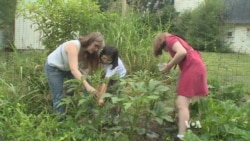Maureen Blake is a divorced, unemployed mother of six children. Because she earns so little, Blake gets money from the federal government that allows her to buy extra food for her family. The program is called SNAP -- Supplemental Nutritious Assistance Program.
Most SNAP recipients use their benefits primarily in large chain supermarkets. Seeking a healthier alternative to the canned and processed food on display at grocery stores, though, Blake used the money to buy plants and seeds from Leesburg Farmers Market and started her own garden. With the help of her kids, she has a harvest every week.
“Every week when I'm going to pick up my food, I have just wonderful, fresh produce," she said. "We’re getting four or five cucumbers every week, six to eight zucchinis. It varies in size. There is always tons of chard and lettuce.”
All this food would cost a fair amount in a grocery story, but the decision to grow her own has saved her money. Each plant can cost as little as $3, and can produce pounds of vegetables, making it very cost-efficient.
“Most of the plants will take about a month to produce. We’re just eating fresh vegetables we never would have discovered or had before,” said Blake.
More options, and funding
Kathryn Willis, Leesburg Farmers Market spokeswoman, said SNAP recipients can follow Blake's lead and plant their own fresh vegetable and fruits, or they can buy the fresh produce directly from the farmers at the market.
“When a customer comes in, they bring their SNAP card. It runs like a credit card through a machine. When they want $10 off their card they run it to the machine," she explains. "They have $10 worth of wooden tokens. They can use with any of the venders in the market.”
Consumers using SNAP cards at the market also will receive a huge bonus: double dollars. For every $10 spent at the market, SNAP customers will get an additional $10 dollars in purchasing power. To sustain the matching program, a number of community organizations are donating funds.
Fighting obesity
Amanda Huffman, healthy living advocate for the Loudoun County Health Department said the program's goals go beyond just putting food on the table.
Organizers also are hoping to teach families how to eat healthy.
“The children in Loudoun County who are uninsured, or who have families in lower poverty level, they are growing in obesity," she said. "That’s contributing to chronic disease. So being able to help them learn one bit at a time what it means to eat well is a beautiful thing. Helping them get excited about walking to the market with their parents, that's an activity, as well as learning about food.”
The program encourages parents and kids to make better dietary choices
“Any vegetable is better than nothing," she added. "When you’re looking at the choice between a bag of chips and a bag of fresh apples, that’s a great option.”
That’s what Maureen Blake’s daughter, Caitlin, is learning.
“I notice with my pickier sister, planting your own vegetable really helps her," said Caitlin. "She really gets excited about it. She’s like, 'yes, I planted the zucchini, now I have to cook it.'”
That's changed the way the family eats, said Maureen Blake. “What it does change is your diet because you end up cooking and being creative and learning.”
And the lessons these kids are learning here are likely to stay with them forever.










